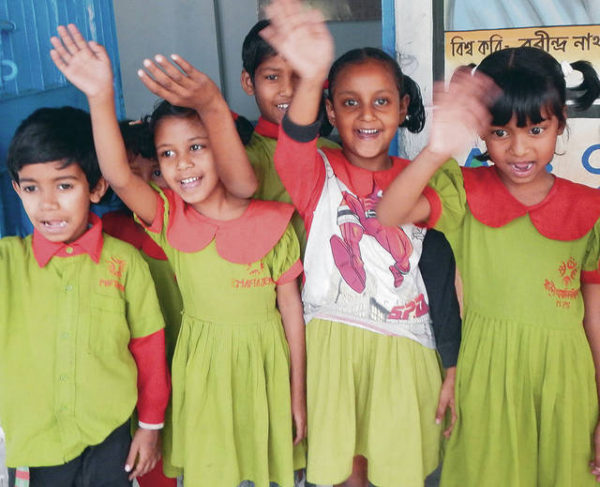Published in the Ocean Watch column, Honolulu Star-Advertiser © Susan Scott
May 12, 2018
Bangladesh is one of the last places you would expect to hear hundreds of schoolchildren shouting, “Aloha!” but it’s happening in a town called Dinajpur.
Last week Craig and I made our annual trip to Bangladesh, and I’m writing about the clinic, school and microcredit program we Aloha Medical Mission volunteers started there in 1997. The column is still about water, though, because Bangladesh is one huge river delta.
About the size of Wisconsin, Bangladesh was historically part of India. When the English partitioned the subcontinent in 1949, Bangladesh became East Pakistan.
 In addition to teaching kids in English and Bengali,
In addition to teaching kids in English and Bengali,
ASSB provides them with uniforms, shoes and food.
©2018 Susan Scott
Revolutionaries fought for independence from West Pakistan in 1971 and, with the help of the United States, won. It says a lot about the Bangladeshi people that even in our current political climate of racism and religious intolerance, they still welcome Americans with open arms.
Bangladesh lies south of the Himalayas where the mountains drain snowmelt and rain into countless rivers and tributaries that empty into the Bay of Bengal. All that water brings life and beauty to the country, supporting endless rice fields, irrigating corn and other crops and filling aquaculture ponds that grow tilapia and catfish. Mango trees droop with fruit. We ate watermelon and pineapple daily, and people loaded our hands, and draped our necks, with flowers.
When, in 1997, a Bangladeshi-American asked our local volunteer organization, the Aloha Medical Mission (goo.gl/eZM353) board, for help in starting a clinic for the poor, Craig and I volunteered. We thought we would go once, get something started and then continue visiting the Philippines, China and other places AMM regularly serves.
But after meeting an extraordinary Bangladeshi family — seven adult siblings and their spouses — who believe their mission in life is to help the indigent, we fell in love. The feeling was mutual, and together we formed Aloha Social Services Bangladesh. Twenty-one years later the organization, an official branch of AMM, blossoms.
This column is a departure from my usual musings, but because world news is so depressing, I want to share with my readers the burst of hope that I and my fellow AMM volunteers feel when in Bangladesh. The people we meet there, 90 percent Muslim, are a caring, gentle group who live their Islamic beliefs, giving a minimum of 2.5 percent of their income to the poor.
For those who can’t afford to give money, charity comes in the way of helping others, be it food, shelter or offering a smile to a stranger.
For most Americans, Bangladesh is about as foreign as you can get in language, dress, food, topography and customs. But when ASSB’s smiling, waving children call out, “Aloha!” during classroom visits, to us Hawaii residents it feels like home.